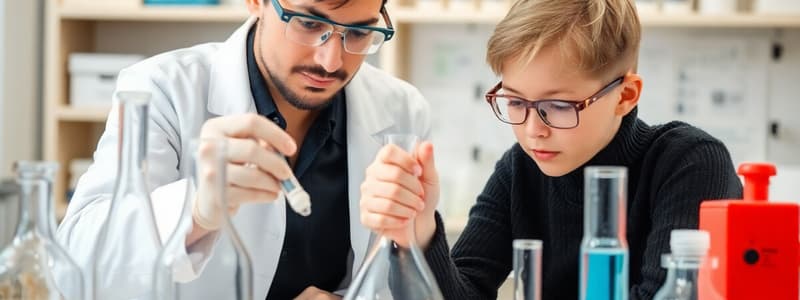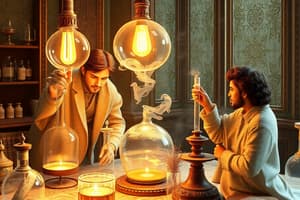Podcast
Questions and Answers
What process involves grouping or ordering objects into categories based on their characteristics?
What process involves grouping or ordering objects into categories based on their characteristics?
- Describing
- Inferring
- Classifying (correct)
- Comparing
Which process includes making observations using the five sense organs?
Which process includes making observations using the five sense organs?
- Observing (correct)
- Predicting
- Experimenting
- Measuring
What is the primary focus of the process known as hypothesizing?
What is the primary focus of the process known as hypothesizing?
- Organizing collected data
- Making predictions based on data
- Performing tests to validate a theory
- Stating the expected outcome of an experiment (correct)
Which process involves explaining reasons behind observations made through the senses?
Which process involves explaining reasons behind observations made through the senses?
What is the purpose of the process called measuring?
What is the purpose of the process called measuring?
Which term best describes the act of performing experiments to test a previous assumption?
Which term best describes the act of performing experiments to test a previous assumption?
What does collecting data involve?
What does collecting data involve?
__________ is telling the color, size, shape, taste, texture and other observable characteristics of an object.
__________ is telling the color, size, shape, taste, texture and other observable characteristics of an object.
__________ is the process of stating the expected outcome of an experiment.
__________ is the process of stating the expected outcome of an experiment.
__________ refers to using standard measures or estimations to describe specific dimensions of an object or event.
__________ refers to using standard measures or estimations to describe specific dimensions of an object or event.
__________ is giving reasons or explanations based on observed trends or patterns.
__________ is giving reasons or explanations based on observed trends or patterns.
In science, __________ involves organizing data and drawing conclusions from it.
In science, __________ involves organizing data and drawing conclusions from it.
__________ is giving the relationship of two objects by telling their similarities and differences.
__________ is giving the relationship of two objects by telling their similarities and differences.
Collecting qualitative and quantitative data is referred to as __________.
Collecting qualitative and quantitative data is referred to as __________.
Flashcards
Classifying
Classifying
Grouping objects based on shared characteristics.
Observing
Observing
Using your senses to gather information.
Hypothesizing
Hypothesizing
Predicting the outcome of an experiment.
Inferring
Inferring
Signup and view all the flashcards
Measuring
Measuring
Signup and view all the flashcards
Experimenting
Experimenting
Signup and view all the flashcards
Collecting Data
Collecting Data
Signup and view all the flashcards
Describing
Describing
Signup and view all the flashcards
Predicting
Predicting
Signup and view all the flashcards
Interpreting Data
Interpreting Data
Signup and view all the flashcards
Comparing
Comparing
Signup and view all the flashcards
Study Notes
Observing
- Uses the five senses to understand surroundings.
Describing
- Details an object's color, size, shape, taste, texture, and other observable traits.
Comparing
- Highlights similarities and differences between two objects.
Classifying
- Organizes objects or events into categories based on shared properties.
Hypothesizing
- States the predicted outcome of an experiment.
Measuring
- Uses standard units or estimations to quantify object dimensions.
Inferring
- Explains observations made through the senses.
Predicting
- Offers explanations based on observed patterns and trends.
Experimenting
- Conducting experiments to test hypotheses.
Identifying Variables
- Determining factors affecting an experiment's outcome.
Collecting Data
- Gathering qualitative and quantitative data through observation and measurement.
Interpreting Data
- Organizing data and drawing conclusions.
Observing
- Uses the five senses to understand the surroundings.
Describing
- Details an object's color, size, shape, taste, texture, and other observable features.
Comparing
- Identifies similarities and differences between two objects.
Classifying
- Organizes objects or events into categories based on shared properties.
Hypothesizing
- States the predicted outcome of an experiment.
Measuring
- Uses standard or estimated measurements to describe an object's dimensions.
Inferring
- Provides explanations based on sensory experiences (sight, sound, smell, taste, touch).
Predicting
- Offers explanations based on observed trends or patterns.
Experimenting
- Conducts experiments to test a hypothesis.
Identifying Variables
- Determines factors that can influence an experiment's results.
Collecting Data
- Gathers qualitative and quantitative data through observations and measurements.
Interpreting Data
- Organizes data and draws conclusions from it.
Studying That Suits You
Use AI to generate personalized quizzes and flashcards to suit your learning preferences.





